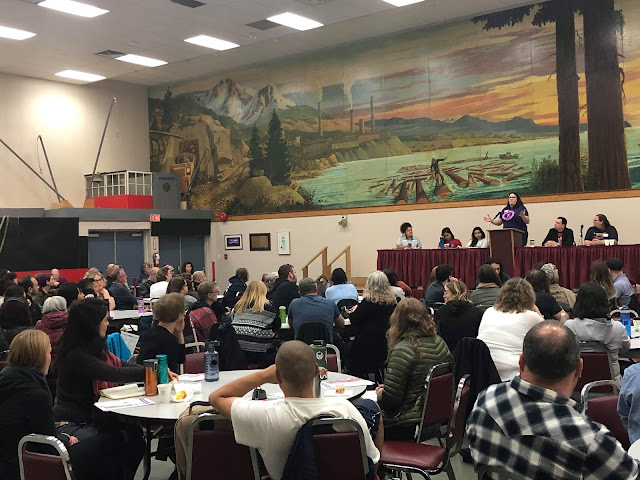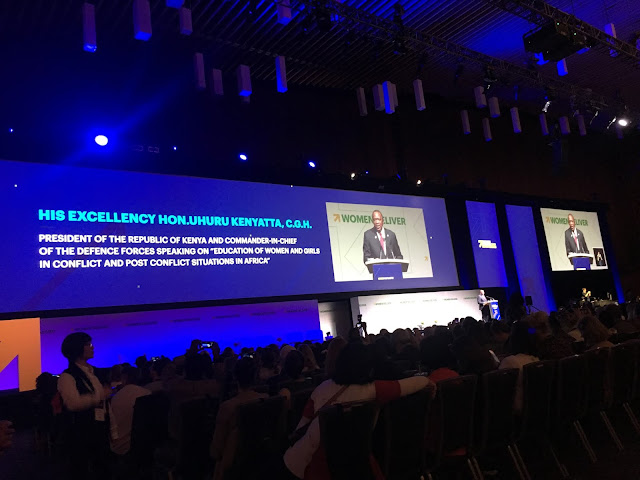Welcome to the New World of Work: Thriving or Surviving
At the end of February, there was a conference held at SFU downtown focused on the theme of work and an evolving economy. The main event was an evening lecture at the Queen Elizabeth Theatre featuring Anne-Marie Slaughter and Van Jones.
Anne-Marie Slaughter is a professor at Princeton University whose area of research is in the area of public policy, law and economy. Her talk centred on three themes; care, craft and the circular economy.
Care:
The context for the caring economy, is looking how the baby boom is impacting the world. 10k people are turning 65 everyday and soon 70% of those 65+ will need long term and 80% of that care is provided by family (because you want older people to stay as autonomous as long as they can). Caregiving jobs are increasing 49% faster than the market. Yikes. Then we have the cost of care - childcare in both the United States and Canada, costs as much or more than housing costs. She gave a shout out to the Horgan government for creating 60k childcare spaces in BC. Childcare isn't just having a space for a child though - it helps a child develop their platform for engagement and quality of social interactions. The care economy looks to all of the jobs that invest in people - healthcare, childcare, eldercare. The jobs in the care economy are changing though - there is significant growth in splitting apart single jobs, and creating a class of paraprofessionals.
We have also seen increase in coaching type jobs - people who specialize in referrals, advising, and mentoring.
Craft:
Smaller scale, lower volume - which means there are lots of opportunities to try new things at a local level. The craft beer market is a good example of specialized production of goods.
Circular Economy:
This is where traditional office/brick and mortar and the digital economies collide. She asked us to reimagine our work because we can live anywhere and work anywhere. She predicts that actually going to the office will be come obsolete and we have to adapt to those pending changes.
At the end of the day as the world of work changes, we have to believe that we can create a better world of work.
Van Jones, a lawyer by trade but a current political commentator - I've seen him on CNN.
His talk focused on the community of genius. Genius lives in all of our communities in all kinds of ways. He talked about how we tap into the genius in marginalized communities - whether it's inmates in the prison system or teenagers in inner city schools - these people are industrious, creative and bright and it's time to value those qualities and find opportunities to empower people to take their innate skills to work.
He talked about the importance and value of hiring women. That they bring a different perspective and approach to work. He really spent his time focused on knowledge holders, and encouraging us to look to different people who may not have the traditional credentials we value in western society but to appreciate what skills people bring to the table.
The Q & A was interesting.
They covered topics like:
- technology - how it can be a great organizing tool. The future is written in code not laws and to enlist tech as part of social change.
- The role of government and the social safety net - a robust discussion about universal basic income ensued.
- When it came to the role of unions they both agreed they were necessary but were quick to point out their shortfalls including the exclusion of people who aren't white men in leadership positions. VJ said that decreasing union density is why there is so much whackadoodle nonsense going on in the States. AMS celebrated the importance of unions and gave a shout out to the labour heritage stories that can be found around the perimeter of the seawall near the convention centre.
- Difference between Canada and the US
- diversity - how in enhances work teams and builds resiliency into work practices.
- Formal education and higher education adapting to the new world of work - learning and unlearning have to occur concurrently . We need to move from pedigree to performance and take paradigms, name them, delete them and rebuild them.
Overall it was an interesting evening where we were challenged to gather together in these geopolitical times to address these problems in the world of work. I left the event inspired to challenge my own prejudices and values on knowledge holders and everyday genius.








Comments
Post a Comment